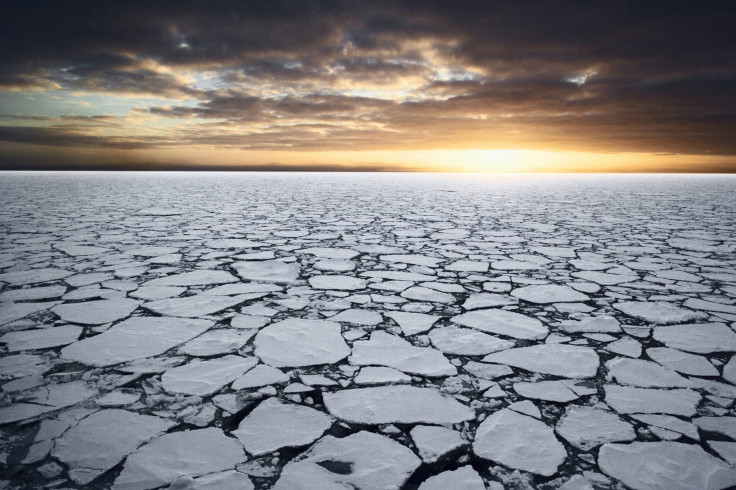An Untouched Sea: 17 Stunning Images Of The World's Last Pure Body Of Water In Antarctica's Ross Sea [PHOTOS]

In recent weeks the world’s attention has been fixed on the Russia-Ukraine fight in Crimea, so many people are unaware of a less spectacular conflict over Antarctica – which, though it is far larger in land mass, and is basically uninhabited – is peaceful in every other way. In fact, the scenes photographer John Weller has documented there -- an effort to draw attention to what's at stake -- are a stark contrast to the violent images coming out of Ukraine.
Antarctica contains what is believed to be the purest sea remaining on Earth, and in the effort to keep it that way, Russia is playing a similar villain’s role.
Antarctica’s Ross Sea, which encompasses 1.9 million square miles, is considered by biologists as the last body of saltwater in the world that is free from significant pollution, invasive species, mining and overfishing.
One might expect the Ross Sea to be far removed from the geopolitical conflicts that grip the world today, but in fact, Russia has for years prevented the pristine habitat from being protected, after Russian diplomats objected to the bill, questioning the very authority of the Commission for the Conservation of the Antarctic Marine Living Resources (CCAMLR) at a meeting in Germany in July 2013.
All of which helps to put Weller's work in context: Here is an isolated, pure remnant of an untrammeled world, which can be protected only by overcoming the obstacle Russia has posed.
“I have to ask myself why we—humanity, that is—would let a compromise be our legacy when it comes to the last remaining intact large marine ecosystem on earth,” Weller wrote for the Pew Charitable Trusts website. "We need to take a stand. We need to open the door to a new age of enlightenment, a new global ocean culture. I believe the Ross Sea holds the key.”
Weller, a Boulder, Colo., resident and world-renowned photographer, visited the area multiple times during the last few years to highlight the vast array of marine wildlife that he says is worth protecting.
The sea is home to minke whales, Adelie and emperor penguins, three different types of killer whales, Weddell seals and a vast array of fish and birds, including the albatross. All in all, about 10,000 species live there. The main aim of the CCAMLR is to protect what it considers to be one of the most diverse and pure ecosystems in the world, and to set a precedent for protecting other critical marine ecosystems around the world.
“We lay down on the surface of the ice, looking up at the sky,” Weller wrote on the Pew website. “The sun warmed our black suits, and we baked, blood flowing back into fingers and toes. Below us, through the ice, we could still hear the chorus, as the seals trilled, chirped, and glugged."
The commission, which serves as the multinational governing body of Antarctica, is struggling to have the Ross Sea designated as a protected marine area. The commisson’s last proposal, unveiled in October 2013 in Hobart, Australia, primarily pushed by the United States and New Zealand, was set for approval until Russia vetoed the deal after its delegation brought their own scientific evidence that allegedly debunked work from the CCAMLR. Interestingly, Ukraine objected, along with China.
The next meeting and vote will take place in October.
The biggest challenge facing the commission is to form a consensus of its 25 member states. They have yet to come to an agreement, primarily due to Russia’s and other fishing nations' rejection of the previous proposal. Norway had made objections regarding the loss in fishing revenue. “CCALMR operates on the basis of consensus and thus we need to gain acceptance of the proposal from all countries,” said Evan Bloom, director of the Office of Ocean and Polar Affairs, U.S. Department of State. “We are close, but still need to close the deal. That involves more negotiation and compromise by all parties, but in the end, we need to have a meaningful MPA [Marine Protected Area] or none at all,” he told International Business Times.
For the committee, the problems run much deeper than the proposed size of the actual protected area, which in recent years has shrunk considerably after objections from member states. Originally, the committee proposed protecting 875,000 square miles, but now only 60 percent is being considered, which would allow some of the current fishing in the region to continue outside the MPA.
Despite the international squabbling over the Ross Sea, Weller has avoided politics in his body of work from Antarctica, choosing instead to focus on its stunning natural scenes, a few of which are highlighted here, from his book The Last Ocean: Antarctica's Ross Sea Project: Saving the Most Pristine Ecosystem on Earth.
Contributory Reporting from Jack Williams @itsjackwilliams
© Copyright IBTimes 2024. All rights reserved.




















